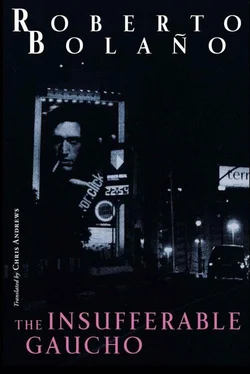He would have been better off reading the Cabbalists. Seven months after his vacation in Punta del Este, before Life of a Newlywed had come out in French, Morini’s new film, The Shape of the Day , opened in Buenos Aires. It was exactly like Life of a Newlywed but better, that is, revised and considerably extended, much as Morini had done with Lost Voices , compressing the novel’s plot into the central part of the film, while the beginning and the end served as commentaries on the main story (or ways into and out of it, or digressions leading nowhere, or simply — and here lay the charm of the procedure — delicately filmed scenes from the lives of the minor characters).
This time, Rousselot was extremely aggrieved. His case against Morini was the talk of the Argentinean literary world for a week or so. And yet, when everyone presumed that he would take swift legal action for breach of copyright, he decided, to the dismay of those who had expected him to adopt a stronger and more decisive stance, that he would do nothing. Few could really understand his reaction. He did not protest, or appeal to the honor and integrity of the artist. After his initial surprise and indignation, Rousselot simply opted not to act, at least not legally. He waited. Something inside him, which could perhaps, without too great a risk of error, be called the writer’s spirit, trapped him in a limbo of apparent passivity, and began to harden or change him, or prepare him for future surprises.
In other respects his life as a writer and as a man had already changed as much as he could reasonably have hoped, or more: his books were well reviewed and widely read, they even supplemented his income, and his family life was suddenly enriched by the news that María Eugenia was going to be a mother. When Morini’s third film came to Buenos Aires, Rousselot stayed home for a week, resisting the temptation to rush to the cinema like a man possessed. He also instructed his friends not to tell him the plot. At first he thought he would not go to see the film. But after a week it was too much for him, and one night, having kissed his baby son and entrusted him to the nanny’s care as if he were leaving for a war and would never return, he stepped out, resignedly, arm in arm with his wife, and went to the cinema.
Morini’s film was called The Vanished Woman , and had nothing in common with any of Rousselot’s works, or with either of Morini’s previous films. As they left the cinema, María Eugenia said she thought it was bad and boring. Alvaro Rousselot kept his opinion to himself, but he agreed. A few months later, he published his next novel, the longest yet (206 pages), entitled The Juggler’s Family , in which he departed from the style that had characterized his work up till then, with its elements of fantasy and crime fiction, and experimented with what, at a stretch, could be called the choral or polyphonic novel. It wasn’t a form that came naturally to him, and seemed rather forced, but the book was redeemed by other features: the decency and simplicity of the characters, a naturalism that elegantly avoided the clichés of the naturalist novel, and the stories themselves, which were slight and resolute, joyful and pointless, and captured the indomitable Argentine spirit.
The Juggler’s Family was, without doubt, Rousselot’s greatest success, the book that brought all the others back into print, and his triumph was consummated by the Municipal Literary Award, presented at a ceremony in the course of which he was described as one of the five rising stars among the nation’s younger writers. But that is another story. It is common knowledge that the rising stars of any literary world are like flowers that bloom and fade in a day; and whether the day is literal and brief or stretches out over ten or twenty years, it must eventually come to an end.
The French, who distrust our municipal literary awards on principle, were slow to translate and publish The Juggler’s Family . By then, fashions in Latin American fiction had shifted north to more tropical climes. When the novel came out in Paris, Morini had already made his fourth and fifth films, a conventional but engaging French detective story and a turkey about a supposedly amusing family vacation in Saint-Tropez.
Both films were released in Argentina, and Rousselot was relieved to discover that neither bore the slightest resemblance to anything he had written. It was as if Morini had distanced himself from Rousselot, or, under pressure from creditors and swept up in the whirlwind of the movie business, had neglected the relationship. After relief came sadness. For a few days Rousselot was even preoccupied by the thought that he had lost his best reader, the reader for whom he had really been writing, the only one who was capable of fully responding to his work. He tried to get in touch with his translators, but they were busy with other books and other authors, and replied to his letters with polite and evasive phrases. One of them had never seen any of Morini’s films. The other had seen one of the films in question but hadn’t translated the corresponding book (or even read it, to judge from his letter).
When Rousselot asked his publishers in Paris if Morini might have had access to the manuscript of Life of a Newlywed before its publication, they weren’t even surprised. They replied indifferently that many people had access to a manuscript at various stages prior to printing. Feeling embarrassed, Rousselot decided to stop annoying people with his letters and suspend his investigations until such time as he could finally go to Paris himself. A year later he was invited to a literary festival in Frankfurt.
The Argentine delegation was sizable and the journey was pleasant. Rousselot got to know two old Buenos Aires writers whom he considered his masters. He tried to help them in any way he could, offering to render the sort of little services one might expect from a secretary or a valet rather than a colleague. This behavior was condemned by a writer of his own generation, who called him obsequious and servile, but Rousselot was happy and paid no attention. The stay in Frankfurt was enjoyable, in spite of the weather, and Rousselot spent all his time with the pair of old writers.
The atmosphere of slightly artificial happiness was, in fact, largely Rousselot’s own creation. He knew that when the festival was over, he would go on to Paris, while the others would return to Buenos Aires or take a short vacation somewhere in Europe. When the day of departure came and he went to the airport to see off the members of the delegation who were returning to Argentina, his eyes filled with tears. One of the old writers noticed and told him not to worry, they would see each other again soon, and the door of his house in Buenos Aires would always be open. But Rousselot couldn’t understand what anyone was saying to him. He was on the brink of tears because he was afraid of being left on his own, and, above all, afraid of going to Paris and confronting the mystery awaiting him there.
The first thing he did, as soon as he had settled into a little hotel in Saint-Germain-des-Prés, was to call the translator of Solitude ( Nights on the Pampas ), unsuccessfully. The phone rang, but no one picked up, and when Rousselot went to the publisher’s offices, they had no idea where the translator might be. To tell the truth, they had no idea who Rousselot was either, although he pointed out that they had published two of his books, Nights on the Pampas and Life of a Newlywed . Finally, a guy who must have been about fifty, and whose role in the company Rousselot never managed to ascertain, identified the visitor, and, abruptly changing the topic, proceeded to inform him, in an absurdly serious tone, that the sales of his books had been very poor.
Читать дальше












